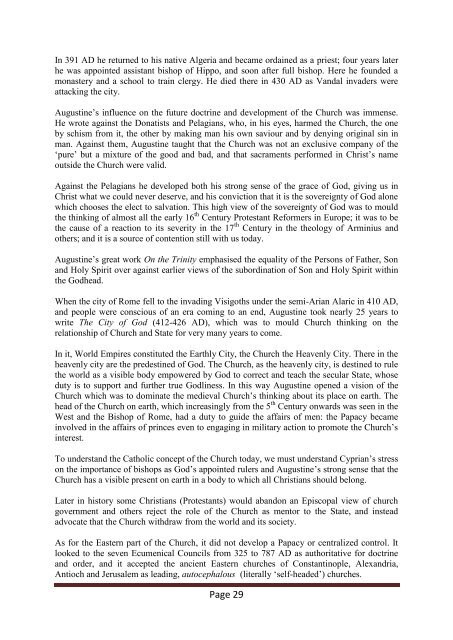Digging Out the Embedded Church - The Maranatha Community
Digging Out the Embedded Church - The Maranatha Community
Digging Out the Embedded Church - The Maranatha Community
Create successful ePaper yourself
Turn your PDF publications into a flip-book with our unique Google optimized e-Paper software.
In 391 AD he returned to his native Algeria and became ordained as a priest; four years later<br />
he was appointed assistant bishop of Hippo, and soon after full bishop. Here he founded a<br />
monastery and a school to train clergy. He died <strong>the</strong>re in 430 AD as Vandal invaders were<br />
attacking <strong>the</strong> city.<br />
Augustine‟s influence on <strong>the</strong> future doctrine and development of <strong>the</strong> <strong>Church</strong> was immense.<br />
He wrote against <strong>the</strong> Donatists and Pelagians, who, in his eyes, harmed <strong>the</strong> <strong>Church</strong>, <strong>the</strong> one<br />
by schism from it, <strong>the</strong> o<strong>the</strong>r by making man his own saviour and by denying original sin in<br />
man. Against <strong>the</strong>m, Augustine taught that <strong>the</strong> <strong>Church</strong> was not an exclusive company of <strong>the</strong><br />
„pure‟ but a mixture of <strong>the</strong> good and bad, and that sacraments performed in Christ‟s name<br />
outside <strong>the</strong> <strong>Church</strong> were valid.<br />
Against <strong>the</strong> Pelagians he developed both his strong sense of <strong>the</strong> grace of God, giving us in<br />
Christ what we could never deserve, and his conviction that it is <strong>the</strong> sovereignty of God alone<br />
which chooses <strong>the</strong> elect to salvation. This high view of <strong>the</strong> sovereignty of God was to mould<br />
<strong>the</strong> thinking of almost all <strong>the</strong> early 16 th Century Protestant Reformers in Europe; it was to be<br />
<strong>the</strong> cause of a reaction to its severity in <strong>the</strong> 17 th Century in <strong>the</strong> <strong>the</strong>ology of Arminius and<br />
o<strong>the</strong>rs; and it is a source of contention still with us today.<br />
Augustine‟s great work On <strong>the</strong> Trinity emphasised <strong>the</strong> equality of <strong>the</strong> Persons of Fa<strong>the</strong>r, Son<br />
and Holy Spirit over against earlier views of <strong>the</strong> subordination of Son and Holy Spirit within<br />
<strong>the</strong> Godhead.<br />
When <strong>the</strong> city of Rome fell to <strong>the</strong> invading Visigoths under <strong>the</strong> semi-Arian Alaric in 410 AD,<br />
and people were conscious of an era coming to an end, Augustine took nearly 25 years to<br />
write <strong>The</strong> City of God (412-426 AD), which was to mould <strong>Church</strong> thinking on <strong>the</strong><br />
relationship of <strong>Church</strong> and State for very many years to come.<br />
In it, World Empires constituted <strong>the</strong> Earthly City, <strong>the</strong> <strong>Church</strong> <strong>the</strong> Heavenly City. <strong>The</strong>re in <strong>the</strong><br />
heavenly city are <strong>the</strong> predestined of God. <strong>The</strong> <strong>Church</strong>, as <strong>the</strong> heavenly city, is destined to rule<br />
<strong>the</strong> world as a visible body empowered by God to correct and teach <strong>the</strong> secular State, whose<br />
duty is to support and fur<strong>the</strong>r true Godliness. In this way Augustine opened a vision of <strong>the</strong><br />
<strong>Church</strong> which was to dominate <strong>the</strong> medieval <strong>Church</strong>‟s thinking about its place on earth. <strong>The</strong><br />
head of <strong>the</strong> <strong>Church</strong> on earth, which increasingly from <strong>the</strong> 5 th Century onwards was seen in <strong>the</strong><br />
West and <strong>the</strong> Bishop of Rome, had a duty to guide <strong>the</strong> affairs of men: <strong>the</strong> Papacy became<br />
involved in <strong>the</strong> affairs of princes even to engaging in military action to promote <strong>the</strong> <strong>Church</strong>‟s<br />
interest.<br />
To understand <strong>the</strong> Catholic concept of <strong>the</strong> <strong>Church</strong> today, we must understand Cyprian‟s stress<br />
on <strong>the</strong> importance of bishops as God‟s appointed rulers and Augustine‟s strong sense that <strong>the</strong><br />
<strong>Church</strong> has a visible present on earth in a body to which all Christians should belong.<br />
Later in history some Christians (Protestants) would abandon an Episcopal view of church<br />
government and o<strong>the</strong>rs reject <strong>the</strong> role of <strong>the</strong> <strong>Church</strong> as mentor to <strong>the</strong> State, and instead<br />
advocate that <strong>the</strong> <strong>Church</strong> withdraw from <strong>the</strong> world and its society.<br />
As for <strong>the</strong> Eastern part of <strong>the</strong> <strong>Church</strong>, it did not develop a Papacy or centralized control. It<br />
looked to <strong>the</strong> seven Ecumenical Councils from 325 to 787 AD as authoritative for doctrine<br />
and order, and it accepted <strong>the</strong> ancient Eastern churches of Constantinople, Alexandria,<br />
Antioch and Jerusalem as leading, autocephalous (literally „self-headed‟) churches.<br />
Page 29








